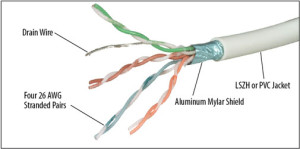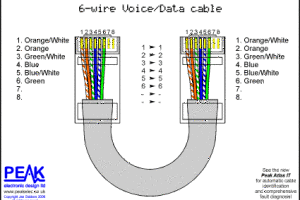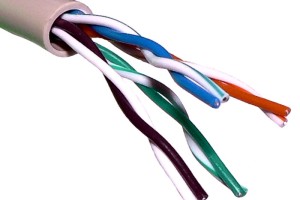 It can be confusing for the consumer to know the difference between one wire and another. As a certified electrician, there are questions you will be asked about what cable is being installed and why that one. There is a simple way to put into layman’s terms the difference between Category 6 (more commonly known as Cat6) and Cat5 wires.
It can be confusing for the consumer to know the difference between one wire and another. As a certified electrician, there are questions you will be asked about what cable is being installed and why that one. There is a simple way to put into layman’s terms the difference between Category 6 (more commonly known as Cat6) and Cat5 wires.
If you are lucky, you’ll never have to uninstall Cat5 from a home or yikes, a business. It is nearly obsolete in modern times, but when it came out it quickly became an industry standard. Cat5 could only handle 100 Mbps. This wire is mostly found in places that haven’t had upgraded their wiring in a very long time.
Cat5e is the “new and improved” version of Cat5. Its features included 1000 Mbps and a process which eliminated much of the crosstalk caused from exposed or touching wires. This wire eliminated many of the problems associated with Cat5, but it was not good enough to keep up with the increasing demand of a technologically driven society.
Along comes Cat6. Capable of handling 250 MHz and equipped with an internal separator to keep paired wires from crossing. This wire is usually seen in the business and commercial industries where communication needs to be quick and reliable. This wire costs more than Cat5e wires, but for some business’ this has the potential to become a thing of the past.
More and more frequently, there is becoming an emergence of shielded cable. Shielded cable is very well insulated. Not only is each pair wrapped in foil, but the whole set of wires is covered with a braided layer. This wire is the creme de la crème of wires. As such, it is more expensive than Cat 6.
There is an extra to look for, especially when installing new ethernet plugs. It is called snagless. This just means that there is an extra shield which keeps the clip from catching on something and snapping off. It is also a great feature when trying to snake wire through a wall.
It is hard to see what may be the next evolution for wire. Will Cat 7 have self trimming ends? With the constantly evolving demand for faster speeds, more bandwidth, and less Crosstalk, the wire engineers need to go 20 years in the future and predict the demands. Not only the demands of the consumer, but also the demands of the industry itself.
There will be no shortage of those who are cutting edge in the field. All the newest tools and equipment and techniques need to be known. Those businesses who upgrade their internet connection may not know the science behind it, but they will always want to work with those who have the most current training. It is the only way to keep up with the increased amount of competition that occurs in society today.




